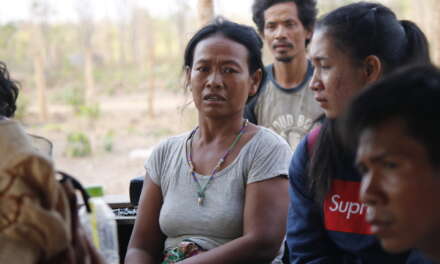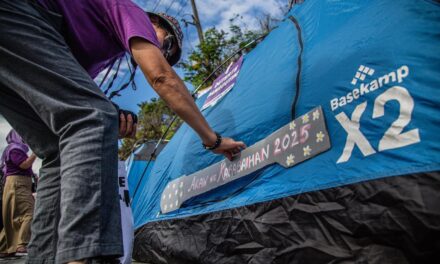An analytical distinction should be made between US political interventions employing primarily economic weapons in order to destabilize a popular or nationalistic government, AND a US military intervention employing (subsequently) political and economic means in order to “stabilize” an implanted regime. Most interventions US interventions in Latin America took the form of the first, albeit indirect proxy military pressure was placed on Nicaragua. However, the 2004 intervention in Haiti, as with Iraq and Afghanistan, belong to the second category. The strategies and the stakes are different, but the end goal is the same: control.
Traditionally the US will act against elected governments in Latin America that show inclinations to redistribute wealth and challenge imperial/corporate hegemony. Aside from destabilization as was the case against the Allende government in Chile in 1973 utilizing covert operations. Additionally, in recent times, interventions make use of political and electoral mechanisms to help insure the victory of pro-US candidates and/or denying legitimacy to independently elected official, particularly those that refuse to undergo privatization and liberalization. In Venezuela, the United States is making use, through the pro-US opposition, of the Electoral Council and the Judiciary, along with the principal press organs, to force President Chávez out of office. Coup makers one year ago proved to be funded by the National Endowment for Democracy, whose mandate in general is to “strengthen” democracy.
In Nicaragua and elsewhere, the National Democratic Institute and especially the International Republican Institute—congressionally funded foreign policy wings of the Democratic and Republican parties respectively —engage directly with pro-US oppositions, including media and labor unions. At the same time the US government and the international financial institutions will cut off loans, credits and aid pushing third country donors to freeze cooperation, as was the case in Haiti and Nicaragua. The political interventions do not shy away from violence, fomenting provocation and confrontations with authorities: All in the name of democracy.
Oil wealth makes it difficult for the US to employ economic intervention as effectively in Venezuela, as it has in the cases of Nicaragua and Haiti. Washington exploits and expands existing social-cultural contradictions in order to further its interests, creating, if need be, its own social base.
During the 1980s the Sandinista Government resisted US military pressure and an economic embargo. The government overcame the military (contra) pressure, but lost control of the economy. In 1990, the government was forced to call elections in which the Sandinista Party (FSLN) lost to a US-organized and financed legal opposition coalition, while holding the contra army in reserve in case the FSLN won at the polls as was expected. The US would support the results of a “free” election only if its own side won. The US and the right wing in Central America have made extensive use of scare tactics to influence the electoral results, most recently in El Salvador in the March 21, 2004 elections.
Regime imposition as the product of military intervention introduces new variables, although other elements remain constant. The objective is sustaining a regime created by the US and which it must uphold at almost any cost. Haiti (following the overthrow of Aristide), Kosovo, Afghanistan and Iraq may be examples.
TRANSFORMING POLITICAL INSTITUTIONS
What the imperialist’s call “nation-building” or “peace-building” refers to the need to construct and uphold a political and social regime in the “post-war” or, more accurately, post-military intervention scenario. It entails a qualitatively more intensive modality of engagement characterized by acute micro-management of the proxy government. According to the influential right wing think tank Rand Corporation’s best practices study, “nation-building” is not primarily about rebuilding a country’s economy, but about transforming its political institutions.
Washington assigns some of the task to the European Union or NATO in the case of the Balkans and Afghanistan, but this has not been the case so far in Iraq. East Timor represents a different situation where the UN was told to re-assume trusteeships of the new nation. It is with Afghanistan and particularly Iraq that the United States has assumed the full-fledged responsibility for “nation-building” (absent in Somalia and experimented with in Bosnia and Kosovo) and with it a long term commitment to maintain its presence in all forms.
Massive US occupation carries its dynamics extending far and deep into the post-war “reconstruction” and characterized by an enduring US military presence including permanent bases. The historical precedents are Germany and Japan following the Second World War. As in Iraq, the goal was to eradicate a regime, including the dismantling of its military, ensuring the re-orientation of its politics and educational systems. Direct assumption of police and security by US troops is a crucial differentiation where the emphasis is on “stabilization” not de-stabilization.
An influential Rand Corporation study insists this is the essential policy and historical framework that is—or should be—the one guiding present US policy and planning for the period following the alleged military withdrawal. Robert Brenner has referred glowingly to the report and its recommendations. According to that study, “early elections [Bosnia] driven by a desire to fulfil departure deadlines and exit strategies, can entrench spoilers and impede the process of democratization.”
Lagging far behind the US in terms of military capacity, the Europeans and the multilateral institutions including the UN and the World Bank, are more focused on insuring the economic “fundamentals” and the involvement of “aid” agencies in reconstruction and “nation-building”. Rationalizations abound: some would highlight the advantages of a division of reconstruction labor while others try to put on the best face on submission, particularly after the invasion of Iraq. In Kosovo the US called the shots but paid only 16% of the reconstruction costs and fielding only 16% of the peacekeeping troops. In effect, the ousting of Hussein gave new impetus to the debate over the role of the United Nations in “post-conflict” countries. According to the Rand Corporation study, similar successes depended on “the ability of the US and its principal allies to attain a common vision of the enterprise’s objectives and then to shape the response of the relevant institutions, principally NATO, the EU and the UN, to the agreed purposes.”
Political intervention in post-Sandinista proved massive and open. Nicaragua received the highest per-capita assistance of any country in the world. The strategy was to prevent the Sandinistas from coming back to power and reducing its influence in political institutions and societal organizations. USAID went to work in creating parallel non-Sandinista civil society (unions, farmers, NGOs, community-based organisations) that could rival the strong Sandinista influence of the established organizations. Particular pressures—through the new President– were placed on the Army and Police to strip themselves of Sandinista influence. A series of NGOs came into being with a “pro-democracy” agenda.
AN ‘ENABLING’ CIVIL SOCIETY
Where the two interventionary processes meet is at the level of “democracy building” also termed the promotion of “good governance”. The United States and its myriad entities, including NGOs and contractors, work directly with civil society to create new structures in a way that will reinforce macro-level stability and above all does not challenge the Western political and security presence, nor the fundamentals of neoliberal economics. Priority is giving to the establishment of a legal framework protecting property and capital rights.
From contemporary Nicaragua (but also in the South and East) we find the Unites States requires not only an “enabling government” but also an “enabling civil society”, even if it has to be created, divorcing popular movements from the possibilities of democratic local and national political participation. Providing the semblance of “democracy” is crucial to assure that the “free market” prevails and upholds the reality of a legal and ideological regime subservient to corporate capital, the international financial institutions along with the strategic needs of the US military. Hence the political necessity of ensuring the appearance of “consultation”, “participation” and even “national ownership”.
* Alejandro Bendana is director of the Centro de Estudios Internacionales in Managua and was representative of the Sandanista Government to the UN in New York.









